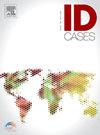An autochthonous case of severe tick-borne encephalitis virus associated meningoencephalitis in France: Is there a place for polyvalent intravenous immunoglobulins?
IF 1.1
Q4 INFECTIOUS DISEASES
引用次数: 0
Abstract
Tick-borne encephalitis virus (TBEV) is a common cause of viral encephalitis in parts of Central and Eastern Europe, with a recent resurgence of cases and geographical expansion. Active immunization results in a high rate of seroconversion and is the most effective measure to reduce the incidence of tick-borne encephalitis (TBE). In France, an endemic country, vaccination is recommended only for travelers staying in rural or forested areas in endemic regions. Polyvalent intravenous immunoglobulin (IVIG) is sometimes used as rescue treatment of viral encephalitis. However, few cases of TBEV meningoencephalitis treated with polyvalent IVIG have been described. We report here a case of autochthonous TBEV meningoencephalitis in a French patient with cranial nerve involvement that was treated with IVIG and discuss the possible mechanisms of action.
求助全文
约1分钟内获得全文
求助全文

 求助内容:
求助内容: 应助结果提醒方式:
应助结果提醒方式:


